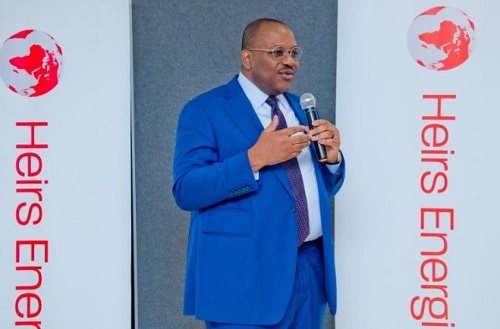Mr. Osayande Igiehon, Heirs Energies CEO
…Heirs Rejuvenates abandon well to enhance Nigeria’s production
The Chief Executive Officer of Heirs Energies, Mr. Osayande Igiehon, has called for renewed urgency in ramping up Nigeria’s oil and gas production, stressing that the country must maximise its hydrocarbon resources before global energy transition reduces their value.
Speaking at a media parley with energy journalists in Lagos on Thursday, Igiehon highlighted the company’s milestones, challenges, and outlook for the future. He described the event as a deliberate step to strengthen collaboration between Heirs Energies and the media, acknowledging journalists’ role in shaping public understanding of the sector.
“We realised that while we had strong relationships with the media teams of our partners, we had not sat down directly with you as a company. This parley is our way of bridging that gap and deepening engagement,” Igiehon said, thanking reporters for their continuous coverage of the energy sector.
The parley which was an interactive session anchored by Executive Director and CFO, Sam Nwanze, who took through a detailed presentation titled “The Heirs Energies Story: From Vision to Impact.” The presentation covered the company founding vision, the OML 17 acquisition journey, production and gas milestones, community investments, and the company’s aspirations across Nigeria and Africa.
Heirs Energies’ Domestic Gas Leadership
Meanwhile, the CEO, Igiehon disclosed that about 85 to 90 percent of the company’s gas output is dedicated to the domestic market, positioning Heirs Energies as the leading supplier of domestic gas in Eastern Nigeria.
“We supply gas to four major power plants—Trans Afam, FIPL, G-PAL, and Geometric—and also serve industrial clusters in the Port Harcourt area. None of our gas is exported. All of it goes into Nigeria’s economy, powering homes, industries, and businesses. We are very proud of that,” he stated.
This commitment, he noted, aligns with the company’s vision of creating value not only for its shareholders but also for communities, partners, and the nation.
Overcoming Existential Threats
Reflecting on challenges faced in recent years, the Heirs Energies boss described 2021 as a near-death experience for the company and the wider industry.
“At the worst point, in December 2021, we were receiving only about three percent of our production at the terminal. It was an existential threat,” he recalled.
However, Igiehon praised recent government reforms, including improved pipeline security and presidential directives that have transformed the industry’s operating environment.
“Today, we are receiving close to 100 percent of our products at the terminal. This kind of turnaround has not been seen in decades, and it is proof of what is possible with the right policies and commitment,” he said.
A Call for Bold Action
Drawing on his 30 years experience in the sector, Igiehon argued that Nigeria is currently experiencing its most favourable period for oil and gas operations. He contrasted the reluctance of investors in earlier years with today’s improved climate, crediting the Petroleum Industry Act (PIA) and security interventions for restoring confidence.
“When we took over operations in 2021, many people doubted our ability to deliver. Within the first 100 days, we reactivated several wells and almost doubled production,” he revealed.
He cited the recent revival of a well that had been shut down for 37 years as an example of Heirs Energies’ determination. “There was nothing technically wrong with the well. The issues were security and operational. By resolving them, we proved what resilience and partnership can achieve.”
Igiehon emphasised that progress requires courage rather than waiting for perfect conditions. “We must act despite challenges. That is the spirit of Heirs Energies, and it is the spirit Nigeria needs.”
Production Over Reserves
The Heirs Energies CEO also weighed in on the debate around reserves versus production. He warned that Nigeria risks underutilising its vast resources if it fails to accelerate output in the face of global transition to renewable energy.
“Reserves are important, but production is what creates value. If you calculate Nigeria’s reserves-to-production ratio, it shows we still have decades of supply. The real question is: are we producing enough to monetise these resources before they lose value?” he asked.
According to him, the country’s economic future is closely tied to oil and gas, making increased production an urgent national priority.
“The imperative for Nigeria—short-term and long-term—is to grow production. Every dollar should go into unlocking and producing more, because that is where both immediate revenues and long-term sustainability lie,” Igiehon stressed.
Setting a Template for the Industry
Heirs Energies, part of the Heirs Holdings Group chaired by Mr. Tony Elumelu, acquired its oil assets in 2021. Since then, the company has positioned itself as a model for indigenous participation in the sector.
“We are not just running this asset for ourselves. We are doing so on behalf of our partners and the country. Every barrel produced contributes directly to national revenue,” Igiehon said.
He maintained that Heirs Energies’ success demonstrates the viability of indigenous operators in a sector once dominated by international oil companies.
Partnership with Media
Closing his remarks, Igiehon reiterated his appreciation for journalists’ role in promoting accountability and awareness in the energy industry.
“You could have been elsewhere today, but you chose to spend time with us. We don’t take that for granted. We see the media as partners in building the future of Nigeria’s energy industry,” he said.
Outlook
As Nigeria navigates the dual challenge of meeting domestic energy demand and preparing for a global shift to cleaner energy, Igiehon expressed optimism that with the right policies, investments, and mindset, the sector can thrive.
“We are a nation defined by resilience and tenacity. Instead of retreating in the face of challenges, we must push forward. That is the only way to secure our economic future,” he concluded.


Comment here